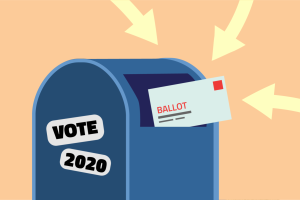Mail-in Ballots Are Convenient, Safe, and Secure and Promote Representative, Inclusive, and Informed Elections
November 1, 2020
“The Port Press is a publication authorized by the Northport – East Northport Union Free School District. The articles and opinions stated in The Port Press are solely the opinions of the individual writer, and do not necessarily reflect the opinions of the Northport – East Northport Union Free School District, Northport High School or any individual affiliated with such entities.”
The most important general election in modern American history is just two days away. As Election Day approaches, the debate over the use of mail-in ballots has come to a head. Many have raised concerns of electoral fraud, foreign interference, and ballots favoring one party over another. Mail-in ballots, however, benefit democracy more than any of the touted rebuttals — many of which are often misleading or downright false.
Mail-in ballots have been proven to contribute to a rise in voter turnout. And the more people who participate in America’s democratic institutions, the better. According to UC Santa Clara, the number of eligible voters has steadily increased over the past few years, but the percentage of eligible voters who actually participate in an election has remained steadfast at around 60%. Research conducted in states that previously adopted mail-in voting shows that mail-in ballots significantly improve this statistic. A study conducted by Pantheon Analytics of Colorado’s voting records during the 2014 midterm election shows that the use of mail-in ballots contributed to a 3.3% increase in voter turnout in the state. Extrapolating that data to a national scale showed mail-in ballots help raise turnout in every state. While this conclusion relies on a predictive model, comparing these predictions to the actual results of the 2014 election verifies the accuracy of those conclusions.
Mail-in ballots are also convenient for voters. As described in an article by The Hill, voters using mail-in ballots in Washington State “appreciate the convenience and the time to study the candidates and measures, enabling them to make more informed decisions”. Mail-in ballots not only allow voters to take their time in voting, but ensure that their vote is better informed and relates to the issues and candidate rather than the party.
Despite their benefits, many prominent politicians are waging a war against mail-in ballots. President Trump tweeted earlier this year that mail-in voting creates “Tremendous potential for voter fraud, and for whatever reason, doesn’t work out well for Republicans.” In making this claim, he posits two common arguments against the system: voter fraud and favoritism of one party over another.
The idea of voter fraud among mail-in ballots is common. Upon analyzing the numbers, however, election experts have asserted that such fraud isn’t likely. The Brennan Center, a bipartisan law and policy institute, reported that “There is no evidence that voting by mail results in significant fraud. As with in-person voting, the threat is infinitesimally small.” Politicians have also denied claims of voter fraud. Colorado Senator Michael Bennett stated in a tweet that after years of experience with mail-in voting, Colorado has seen little fraud, and instead achieved the of second-highest voter turnout among states.
Trump’s claim that mail-in ballots promote partisan favoritism is just as easily disproved. A study conducted by researchers at Stanford University’s Democracy and Polarization Lab concluded that “universal vote-by-mail does not appear to affect either party’s share of turnout” nor “either party’s vote share”. Simply put, both parties reap the benefits of an increased voter turnout brought about by mail-in ballots. Mail-in ballots do not favor of a particular party, but instead serve the American public’s best interests in producing a more representative, inclusive, and informed election.
Other government officials have taken a similar stance as the President on the subject of mail-in ballots. Attorney General William Barr told a New York Times reporter that “We’ve been talking about how, in terms of foreign influence, there are a number of foreign countries that could easily make counterfeit ballots, put names on them, send them in. And it’d be very hard to sort out what’s happening.” Along similar lines as President Trump’s claim of voter fraud, Barr brings forward another common argument: mail-in ballots allow foreign nations to directly interfere with U.S. elections. Tammy Patrick, a former Arizona election official refutes this claim. “[T]here isn’t an election office in this country that doesn’t know how many ballots they’ve mailed out, how many they’ve gotten back in, and who they were sent to,” she says. Election offices take extreme care — which includes keeping close track of the number of ballots sent out and received — to keep America’s democratic institutions secure. Instead of focusing on a non-existent threat of foreign interference in mail-in ballots, energy may be better placed on cybersecurity concerns that include hacking and online disinformation campaigns. As the FBI describes, online foreign influence operations conduct themselves with a mission to “spread disinformation, sow discord, and, ultimately, undermine confidence in our democratic institutions and values.”
At the end of the day, the benefits of mail-in ballots outweigh any of their perceived problems. These ballots improve voter turnout and the convenience of voting without presenting a significant threat of electoral fraud, foreign interference, or partisan favoritism, despite claims by those in power. That’s not to mention the safety that mail-in ballots can provide to voters in the midst of the COVID-19 pandemic. With a growing population, an ongoing pandemic, and the consequential convenience, voting by mail has proven itself to be a safe, effective, and essential future for successful elections — those that truly represent all Americans.

